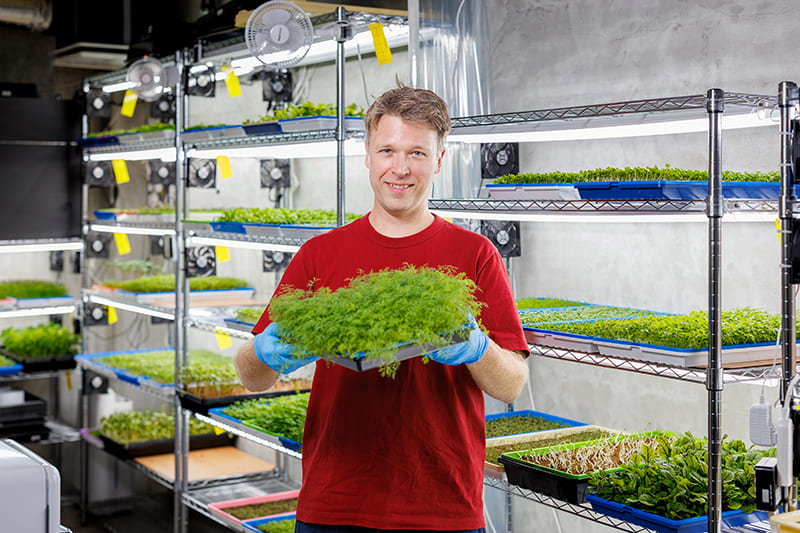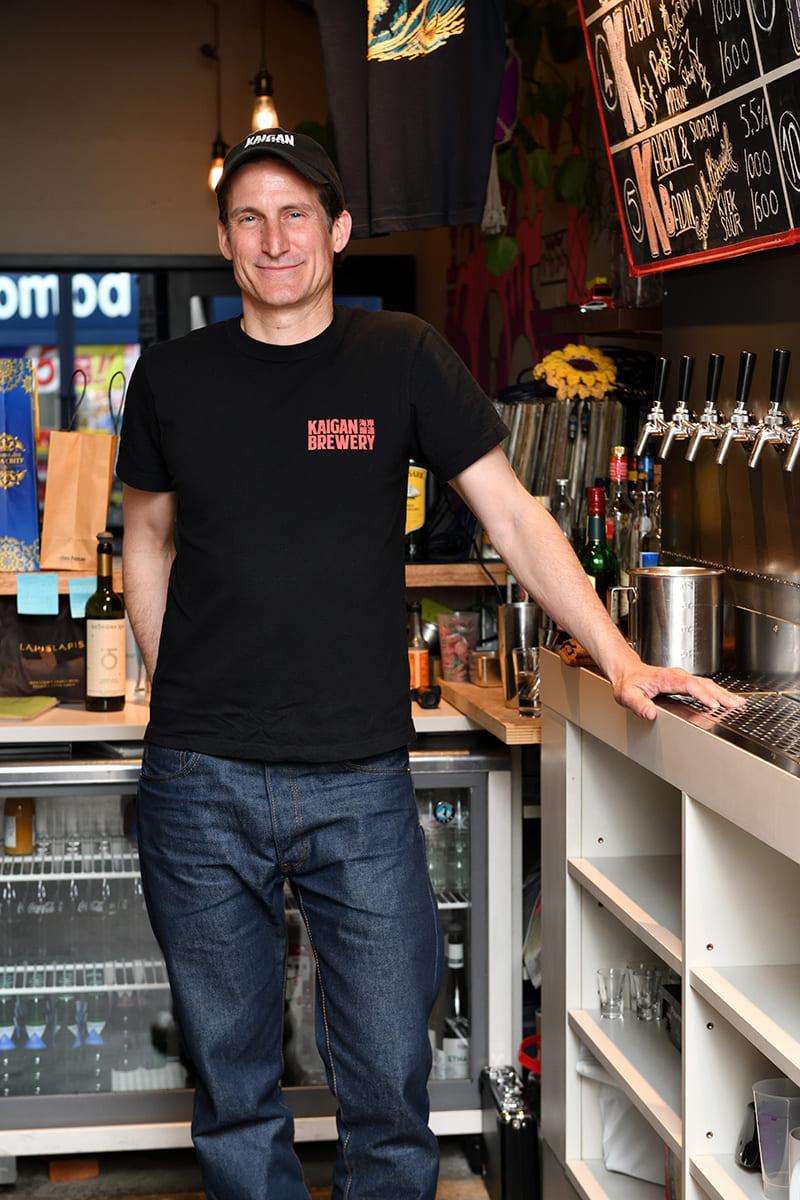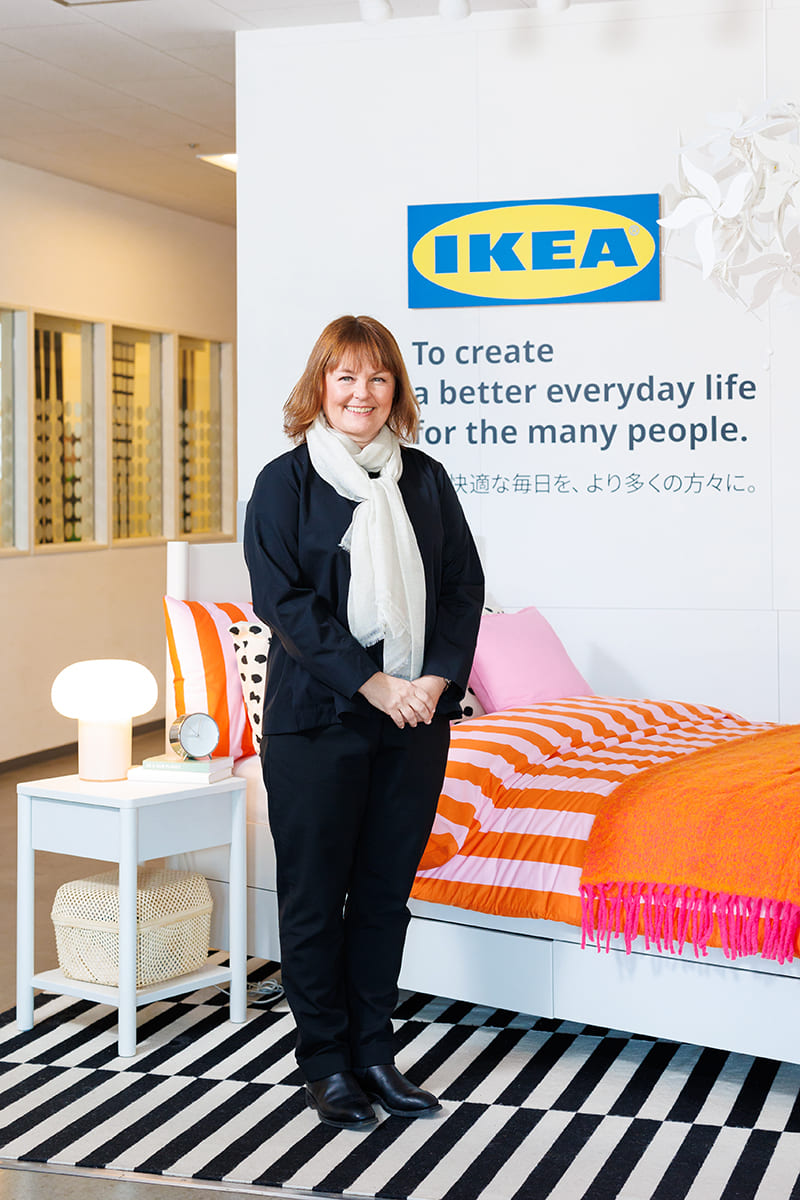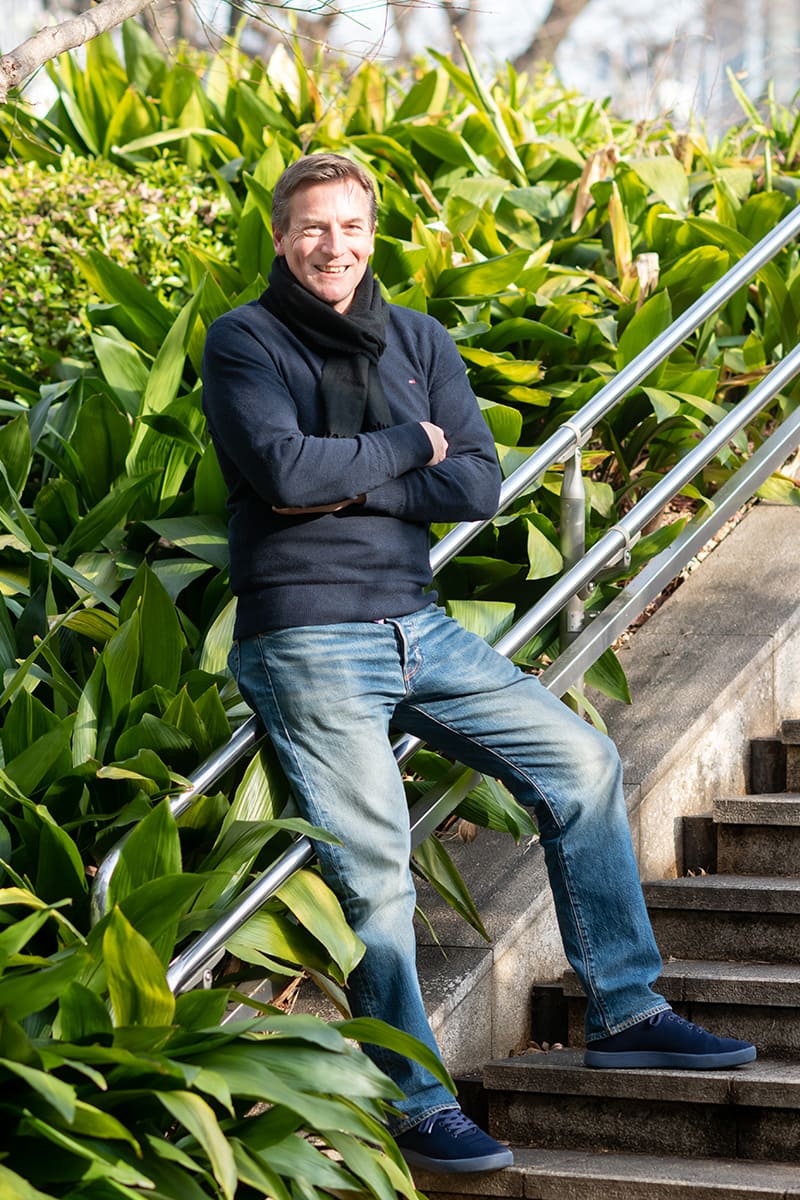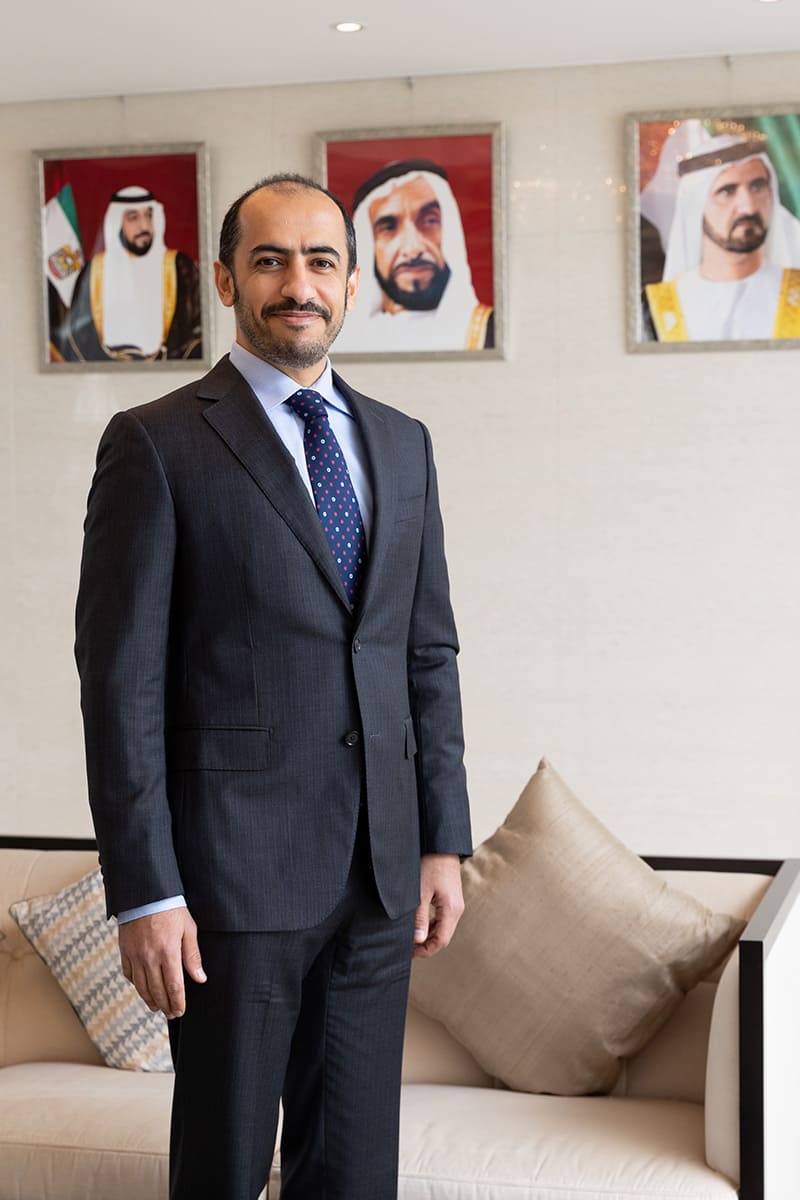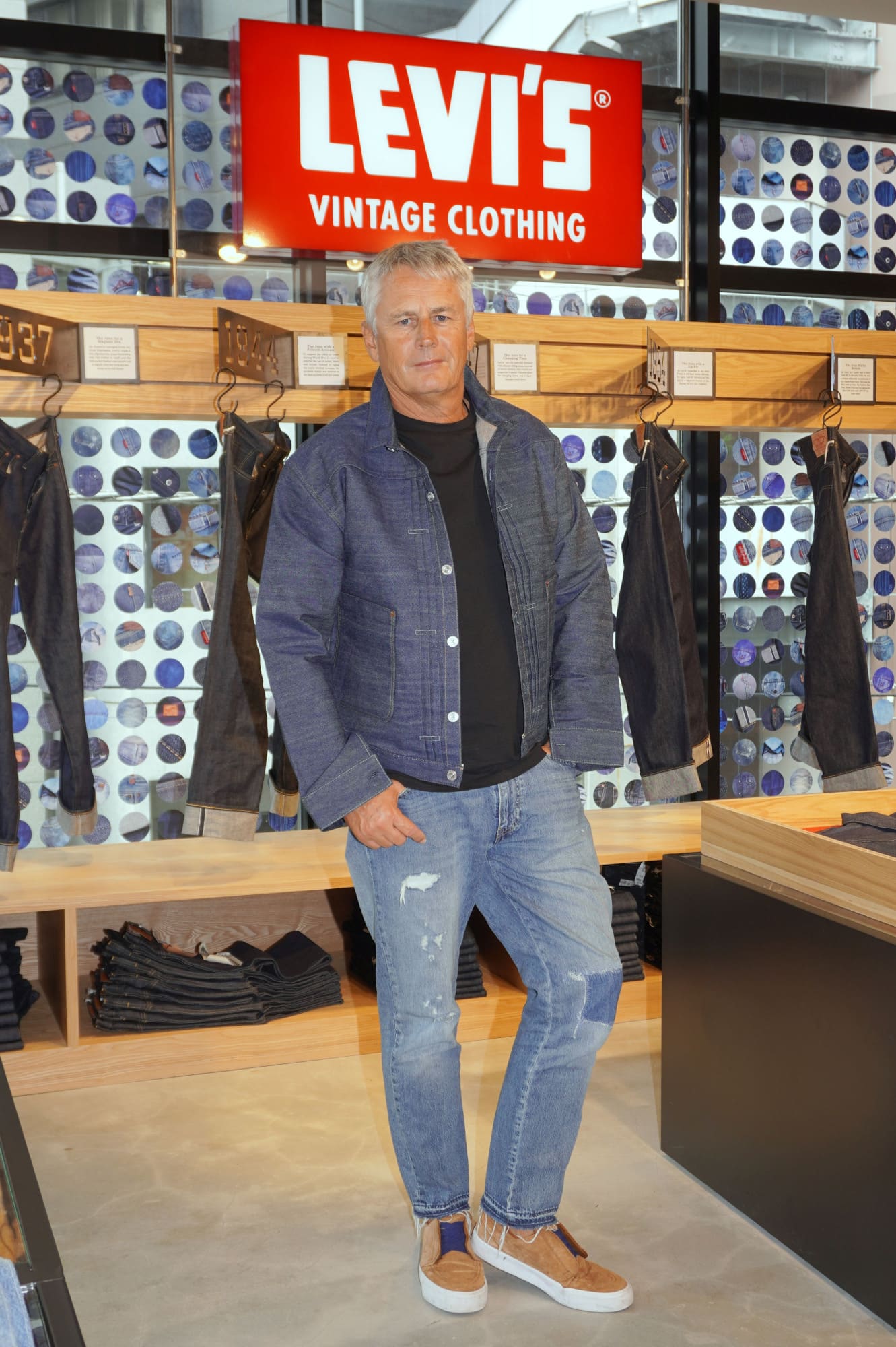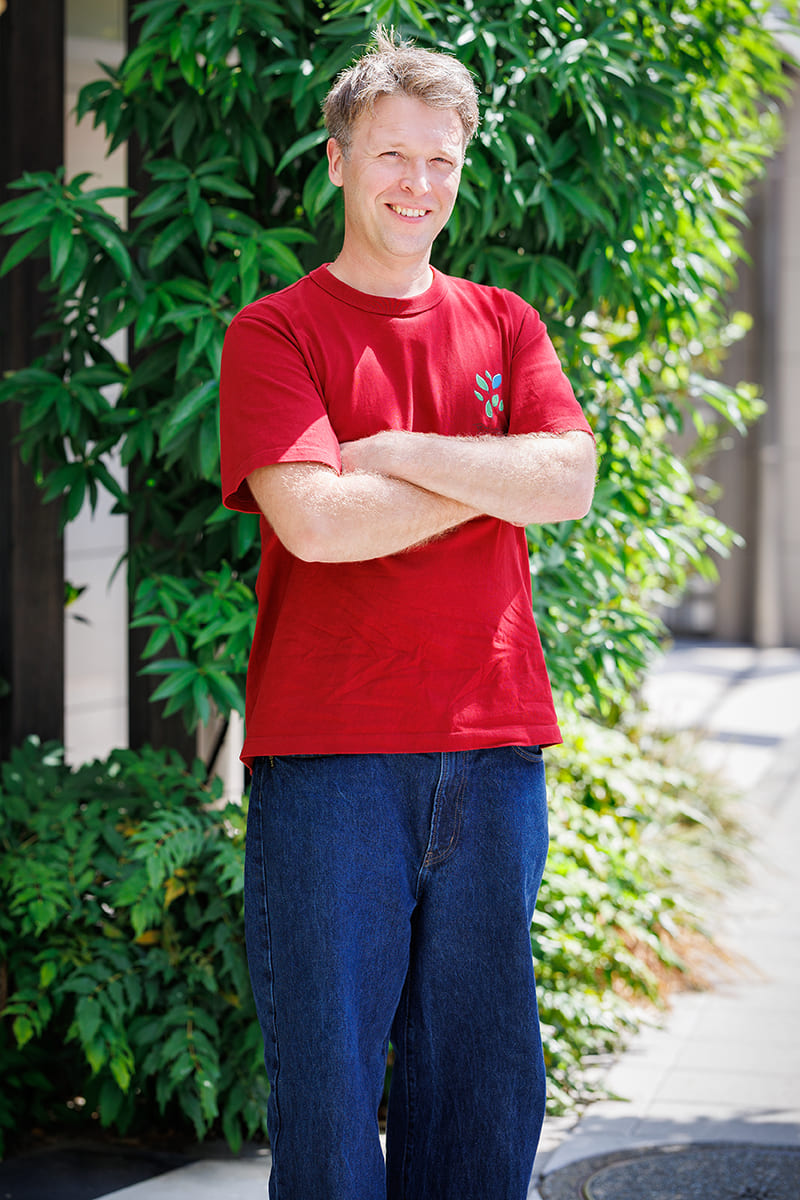
October 14, 2025
Blue Leaf Microgreens: Big impact from urban farm
Matthew Peterson grows premium sprouts, spreads word at schools
Contributing writer
- Name: Matthew Peterson
- Title: Founder of Blue Leaf Microgreens
- URL: https://www.blueleafmicrogreens.com/
- Hometown: California, U.S.
- Years in Japan: 6
They say good things come in small packages. It perhaps follows that the very best things are the smallest — micro, even. Microgreens, harvested just as the first leaves emerge from the seed, are the beautiful tiny herbs and sprouts that chefs use to elevate the aesthetic and flavor of their dishes. Despite their size, they pack an incredible punch in terms of nutrient density and concentrated flavor. Matthew Peterson, the founder of Blue Leaf Microgreens, is growing premium organic microgreens in an underground Tokyo farm. His impact is further distinguished through sharing sustainability practices and conducting community outreach programs in schools.
Tucked into the eclectic enclave of Sangenjaya lies a screen-printing studio. Nothing outside indicates that the basement contains an oasis: a grow space whose shelves are packed with rows and rows of carefully curated trays of absolutely beautiful microgreens, all grown to order for clients across the city. It is hard to imagine that Blue Leaf Microgreens’ first grow space was a spare bedroom.
Peterson originally started growing microgreens in his native Southern California. His journey led him to Dallas, where he grew microgreens for a sushi bar. He was about to pack up and move to New York when a customer changed his life forever. A woman frequenting the sushi bar was in Dallas for a five-month business trip from Tokyo. Lightning struck, and the two fell in love. By the time she had to return to Tokyo in February 2019, the pair were engaged, and a new chapter began for Peterson in Japan. In a way, the origin of Blue Leaf Microgreens was a love story.
He didn’t jump directly into business ownership, and had quite a journey to get to where he is today. At first, he grew and maintained roses at Tokyo Station. Unfortunately, COVID led to downsizing and he was out of work. He then found a job with a German hydroponic startup that was expanding into Japan. It had a series of grow hubs across Europe where it grew fresh herbs directly in supermarkets and was looking to expand to Asia. Things were going well, but unfortunately the war in Ukraine directly impacted the business because the energy source for the European side came from Russia, and the business had to shut down. Although that opportunity didn’t work out, the practical knowledge and skills he gained equipped him to begin his own venture. “It was a good time to do things for myself,” he said, reflecting upon the transition.
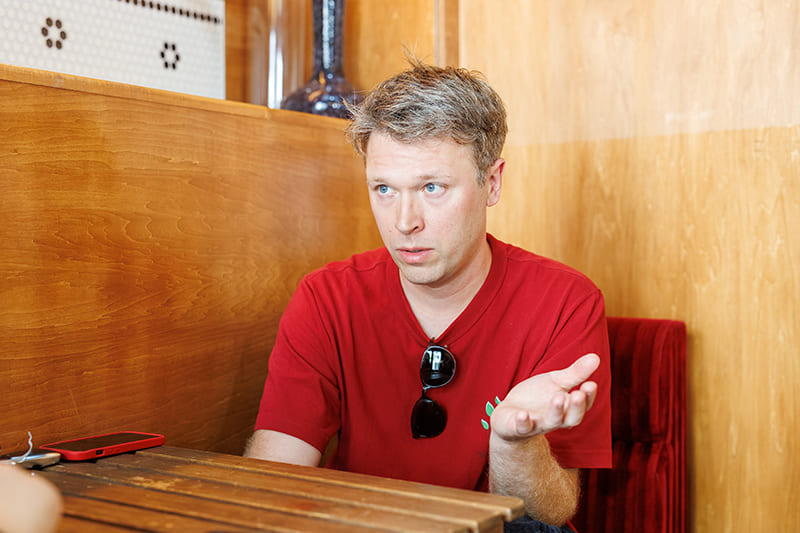
In the spare bedroom, Peterson started testing seeds and trying different varieties, and in the first year was able to develop 18 varieties. His very first client was Coaster Shimokitazawa, which at the time had just opened and now is a well-known Tokyo taproom and kitchen. As he started distributing to more and more restaurants, he began to outgrow the bedroom. One day, walking down the street, he saw a screen-printing studio. Wanting to create T-shirts for his new business, he struck up a conversation with the owner. It turned out that the basement just happened to be ideal for creating a grow space. Being underground and windowless makes it very difficult for insects to get in, and the concrete walls make it easier to control the temperature year-round: “I just use regular 20-watt LED lights,” he said of his energy usage. Now he grows over 40 variants and is in the process of building new shelves to meet growing demand.
“Microgreens are inherently highly sustainable,” Peterson said, and his methods are remarkably clean and efficient compared to traditional farming methods. He doesn’t use soil, which can lose nutrients if not consistently maintained and is just plain messy. Instead, he uses coconut fiber, which is cleaner, compostable and holds water well. Coconut fiber is a byproduct of coconut processing that would otherwise be discarded, so finding uses for it prevents waste. Because of how well the fiber retains water, he uses about 90% to 95% less water than traditional farming methods require to grow the same plants. The lack of insects in the space also means he doesn’t need to use chemical pesticides; the only thing he adds to the water is kombu (kelp), which provides additional nutrients and helps him control the rate of growth for clients who want larger leaves. “The only thing that touches the microgreens is pure filtered water, coconut fiber and sometimes kombu,” he said.
Peterson’s urban farm produces almost no waste. He grows the greens per client requests, so he is able to tightly control the exact amount of seeds required for a specific volume of microgreens. Recently, he has begun experimenting with freeze-drying extra microgreens, which would let him create unique seasoning powders and find various other uses while completely eliminating waste. He also repurposes the spent coconut fiber and organic waste through his relationship with various local schools, where he teaches workshops and classes about sustainability and urban farming and helps kids grow their own plants and vegetables. He composts spent coconut fiber in school gardens, creating new life yet again and leaving the soil in better condition than he found it.
The next step for Blue Leaf Microgreens would be for Peterson to be able to produce his own seeds, giving him total control over the entire growth cycle. This would require an outdoor grow space where he could allow plants to mature and produce seeds. He would still be able to keep his process very clean by continuing to compost the microgreens’ organic waste, removing the need for fertilizers that end up in water runoff when it rains. By layering compost “like a lasagna” and leaving behind the roots of harvested plants, Peterson would improve the soil instead of making it worse, like many agricultural processes do. “Soil is finite, so once it’s gone it’s gone,” he remarked. This harmonious ecosystem is the ultimate goal of the business.
Peterson’s positive impact on the community around him expands far beyond the sustainability of his urban farm. He has found scrappy uses for organic byproducts, wastes almost no water and electricity, and improves his community by teaching the next generation about sustainability and urban farming.
